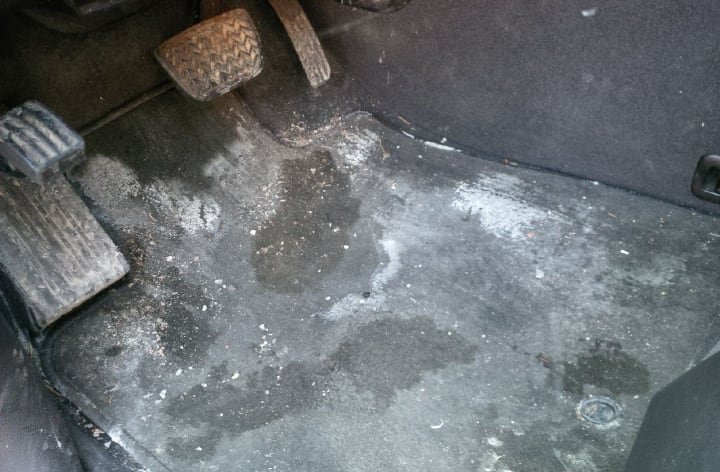Effects of Salt on Your Car
Before you take your car to Daytona Beach, remind yourself of the effects of salt on your car's body...

Daytona Beach is one of the only places in America where you can drive your car on the beach—and honestly, it should stay that way. As glamorous and retrowave as it may seem to drive your car on the beach, it's not a good idea. After all, the beach has plenty of salt in the air, sea, and sand.
The effects of salt on your car are well-documented, especially during the winter when salt is used to melt away snow and ice from the road. Even during the summer, you need to limit your car's exposure to salt.
Wondering what the big deal is? Here's what happens when salt gets on your car...
Salt eats away your paint job—fast.

If you're like many people, your car's paint job was chosen because it's a relatively cheap car mod that makes your machine look awesome. If so, you have every reason to be wary of the effects of salt on your car.
Salt eats away at the protective coatings of your paint job, as well as all the detailing products that help keep that shine in place. Salt that isn't cleared away will continue to damage paint, making all the money you spent on your car for naught.
It also is a leading contributor to rust.
It shouldn't be surprising that one of the most common effects of salt on your car's body involves rust. With the way it can strip away paint, salt has a tendency of leaving the car's bodywork exposed to the elements.
When metal is exposed to salt, water, and air, rust happens. The most common places where rust tends to happen include the car's undercarriage, motor area, and bumpers.
Another pretty damning effect is the way salt can shred your carpets.

If you thought that exterior damage was the only type of damage that you have to worry about, you're wrong. A quick glance at the way rock salt tears up rugs and car mats will show you that interior upholstery has a tendency to take a beating once exposed to road salt damage—or really, any kind of salt.
If you have ever seen a very rusty car exterior, it's almost certain that it had a lot of salt near it.
Cars that are exposed to the elements will all have paint issues. However, when salt is involved, the amount of rust and damage you'll see on the paint is magnified. The best way to prevent salt damage on your car is to wash it off and apply a protective coating as soon as salt gets near your car.
Ugly, isn't it? Well, what's even uglier about the salt on your car is what it does to your car's undercarriage.
We often think of body damage as the thing to watch out for when it comes to salt. It makes sense, since no one wants to have a rusty-looking, beat-up car with a bad paint job. What you may not realize is that rust is actually pretty dangerous to your car's undercarriage.
A lot of the most important parts of your car are in the undercarriage—the frame, the ball joints, shocks, and exhaust system can all be damaged due to salt's rusting effects. Rust weakens metal and makes it brittle.
Rusting shocks, ball joints, and brakes are no joke.
If you're not a gearhead, this may not seem like too big of an issue. However, shocks are what keep your car from falling apart when it hits a bump in the road. Rusted shocks run the risk of snapping and breaking.
Ball joints are what make your car turn, and if they break due to excessive rusting, it could easily cause you to lose control of your car and spin out. Brakes? Well, if those rust until they break, you will very likely end up in a car accident.
Needless to say, salt on your car can be pretty damaging to the overall safety of you and your passengers.
Have you ever seen a car that had the entire body fall in on itself? Or, if you've been in an accident, have you ever noticed that your car didn't quite drive the same? That structural issue is frame damage, and it can potentially cause your car to be undrivable.
That being said, a pinch of salt shouldn't have you freak out. In order for the effects of salt to include frame damage, you really have to neglect your car.
What makes it worse is that most of the damage to your car isn't typically visible.
The undercarriage of a car is wide open, but the problem is, it's also about a foot off the ground unless you have your car positioned on a lift. Assuming you're not a mechanic, you probably will never see the effects of salt on your car first hand.
Extreme weather tends to make salt even more corrosive.

One of the reasons why people choose to wash their cars in the winter is because of the way that salt tends to work. Heat tends to make salt's corrosive properties even more pronounced.
During the winter, the heat from the engine tends to make the excessive salt more corrosive to the undercarriage. During the summer, hot weather means that less salt is needed to cause harm to a car.
Cleaning your car is the easiest way to reduce the effects of salt on your car. Seriously, consider getting your own detailing products or going to a car wash.
If you want to protect your car from body damage, grabbing a car cleaning kit for the salt you'll experience during the winter months is an easy way to make sure that you get the most out of your car's lifespan.
About the Creator
Ossiana Tepfenhart
Ossiana Tepfenhart is a writer based out of New Jersey. This is her work account. She loves gifts and tips, so if you like something, tip her!






Comments
There are no comments for this story
Be the first to respond and start the conversation.